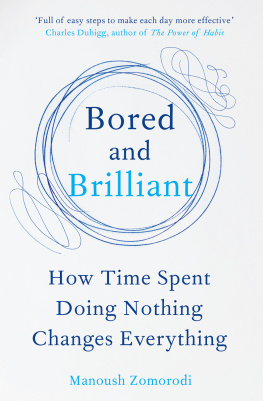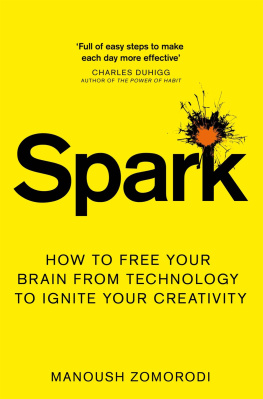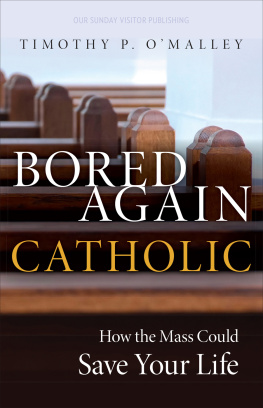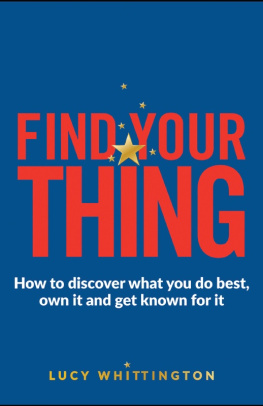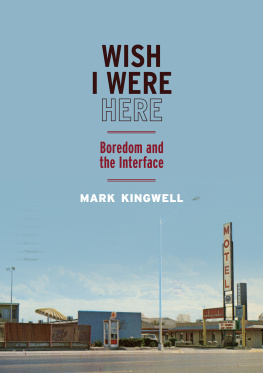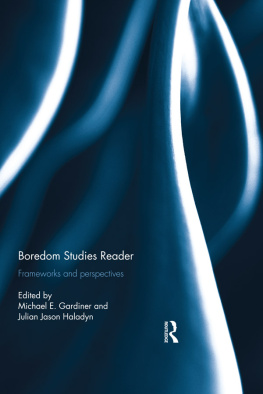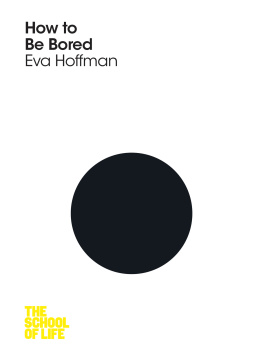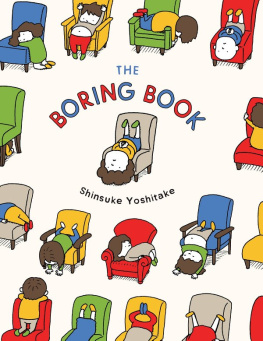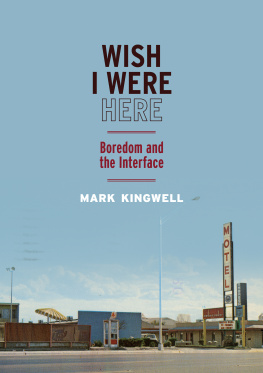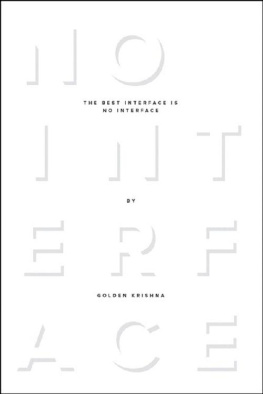Kai and Soraya, without you, I never would have known that boredom could lead to brilliance. You are my two sparkles.
Rebecca Paley, you are the ultimate efficient, clear, and creative collaborator. Ive admired you since our lives first started intersecting over twenty years ago. Working with you was an organizational and intellectual pleasure. Plus, fun. Thank you.
CONTENTS
INTRODUCTION
The Case for Boredom
My son and the iPhone were born three weeks apart, in June 2007. Im more of a 2.0 kind of woman, so I didnt rush out to buy one, and anyway, I had more pressing things to tend to. My new baby was colicky and miserable. I spent hours pushing him around, trying to soothe him to sleep, which he would do only when his stroller was in motion. We probably wandered the equivalent of ten to fifteen miles a day. Our walks were also very quiet because my newborn required utter silence to snooze longer than fifteen minutes at a time, so I couldnt talk on my flip phone or get coffee from the local store or even just sit on a bench. The baby weight flew off, but I was the most bored I had ever been in my entire life.
At first I was angry, frustrated, and sad. It was the classic story of my generation: A woman goes from urban professional to cloistered mom in one shocking instant. Once upon a time, I was a foreign news producer always dropping into emergency situations no matter where in the world they happened. If the Concorde crashed or the parliament in Belgrade was set on fire, I went. For twelve years I worked in the fast-paced world of broadcast journalism. On my time off, I thought nothing of spending an entire Sunday on the couch to plow through The New York Times and the latest novel.
When I became pregnant with my first child, I pictured my husband, Josh, a fellow journalist and adventurer, and me putting the baby in a backpack or something as we traveled the world and were still amazing at our jobs. What a joke. I had no idea. After I had my son, Kai, my ass got kicked so hard. I felt lonely and truly fatigued as never before. New York Times? The latest novel? Us Weekly was the most I could handle between back-to-back nursing sessions and unloading the dishwasher.
After a few weeks of my stroller-pushing marathons, though, there was a shift. Not only did I get into a rhythm, but I also began to see things around my neighborhood that Id never noticed before. Ornamental cornices and gargoyles became familiar friends. I grew to be an expert in the blooming patterns of the neighborhoods landscaping. I even knew the cracks and bumps in the sidewalk by heart. I gave in to the discomfort of nonstop walking and started appreciating the fact that I had no destination. (How many times when I was stuck in the office till all hours of the night would I have given anything to roam aimlessly?) Most important, I came to understand what it means to have symbiosis with your child. Being fully in tune with this beautiful new human being I had created required slowing down to a pace that at first made me feel deeply uncomfortable, then completely transformed me.
Indeed, he grew less and less colicky, and soon enough those days of wandering that had soothed both of us ended. I went back to work and, if Id thought life was busy before, I didnt know the meaning of the word. The next several years flew by in a flurry of personal and professional creativity and effort. I covered tech and business for Reuters, and then New Yorks public radio station, WNYC; wrote my first book (a guide to making video for nonprofits and businesses); and welcomed a daughter, Soraya.
Then in 2013after six months of doing weekly news updates on technology after suggesting WNYC cover more of the sectors burgeoning scene in New YorkI was offered my dream job, hosting my own weekly radio show and podcast about the human side of technology.
Running the show, which would eventually be called Note to Self, I was riding high on possibility. I had the chance to produce something meaningful and interesting about a subject essential to modern life for an intensely responsive group of listeners. This was the opportunity of a lifetime, with creative control and responsibility on a level that I had never experienced before. And if I screwed it up, might never again.
At the start, I was firing on all cylinders. Surrounded by smart, insightful people, I found no shortage of fascinating stories to cover and received great feedback from the public.
Then I hit a wall. Crashed, is more like it. This was different from writers block, which in the past Id experienced as a stuck place I needed to work through. This was a blankness. There was just... nothing. It was bad.
Part of the problem was, of course, the pressure that came with the unbelievable opportunity before me. Wanting to do the best job possible can be crippling. But there was also something else going on.
My mind felt tired. Worn-out. Why? Yes, I was juggling motherhood, marriage, and career in one of the most hectic cities in the world. But it was more than that. In order to analyze what was going on with me, I began by observing my own behavior. What I found was, frankly, exhausting. As soon as I took a moment to reflect, I realized there wasnt a single waking moment in my life that I didnt find a way to filland my main accomplice was my phone.
I had long ago traded in my old flip phone for a smartphone, and now it seemed I spent every spare minute on it. Whether waiting for the subway, in line for coffee, or at my sons preschool for pickup, I was engaged in some kind of information call-and-response. I checked the weather, updated Twitter, responded to e-mails. When I flopped into bed at the end of an exhausting day, instead of turning out the lights, I chose to fire up Two Dotsa game that I couldnt stop playing despite myself. I wasnt using my smartphone to connect. I was using it to escape. Scrolling through Twitter made my long commute disappear. Updating my calendar obsessively gave me the feeling of productivity. As my life ramped up, so had the pace and quantity of my technology consumption. My brain was always occupied, but my mind wasnt doing anything with all the information coming in.
In trying to figure out when, in the past, my best ideas had come to me, I was reminded of my time with Kai. During those long, solitary, tech-free walks, where I was cataloguing the details of everything I saw around me, I also did an internal assessment of the professional skills Id acquired over the previous fifteen years. Like my meandering strolls, it wasnt a conscious accounting but rather a winding mental trip through my career so far and how I might like to put my skills to work next. I let my mind go. It went to some dark and uncomfortable places, but it also went to some weird and wonderful ones.
Looking back at that experience during this hectic period of my life, I saw a connection between a lack of stimulationboredomand a flourishing of creativity and drive. It was so clear to me because the cycle of technological innovation sped up at exactly the same time my life did, too. Between the time my son was born and could walk, we saw mobile technology change the way people called a taxi, ordered food, found a date. Suddenly, very basic societal actions that had remained unchanged for decades were upended. And then, when the next operating system came out six months later, upended again. My life wasnt just pre-children and post-children... it was simultaneously premobile phone, postmobile phone. Both children and smartphones shifted me to the core.

